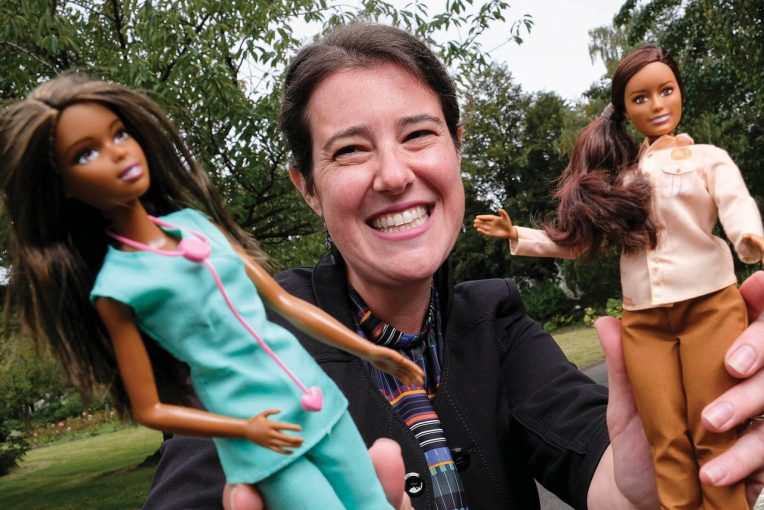Faced with isolation during the first several months of the COVID-19 pandemic, parents sought creative strategies for fostering social and emotional learning at home with their children.
Appears InIn fall 2020, a study led by Illinois State University alum Dr. Sarah Gerson ’06 informed parents about a scientifically supported tool for letting children practice empathy and social skills: a Barbie doll.
“Our research provided some comfort to parents by showing there are ways for children to practice social skills, even when they’re not interacting with other children in the same way they normally would,” said Gerson, a developmental psychologist at Cardiff University in Wales.
Gerson was lead author for the study, published in the journal Frontiers in Human Neuroscience, which used neuroscience for the first time to investigate the impact of doll play on children. Researchers used wireless neuroimaging technology to monitor brain activity of 33 children, between 4 and 8 years old, as they played with dolls.
Gerson and her colleagues found that doll play activated the posterior superior temporal sulcus (pSTS) region of the brain, allowing children to use empathy and social information processing skills, even when playing alone. The researchers observed far less activation of the pSTS when the children played alone with tablet computers.
“This suggested to us that playing alone with dolls engaged their social processing and let them kind of practice these social skills,” Gerson said.
Mattel, the maker of Barbie, commissioned the study to determine if the toy—launched more than 60 years ago—is beneficial to children’s social and emotion learning. Gerson said Mattel officials respected the scientific process and understood that results might not be what they expected.
“There are ways for children to practice social skills, even when they’re not interacting with other children.”
—Dr. Sarah Gerson
Gerson’s doll play research quickly gained international media attention—from Forbes to the Daily Mail. She granted interviews to outlets from South Africa to China.
“I did interviews with like 12 different radio stations in a week, and with different magazines and podcasts,” Gerson said. “But different people had different kinds of questions, and it was interesting, the different angles that people came at it from.”
Gerson and her colleagues are attempting to answer more questions related to doll play through ongoing research. In the study’s second year, researchers reviewed video of the participants playing with dolls and found that children talked more about others’ thoughts and emotions, known as internal state language (ISL), when playing alone with dolls than while playing alone with tablet games.
“It helped foster the idea that they’re practicing these skills when they’re playing with dolls,” Gerson said. “And we found that it was actually related to individual differences in the brain activity we saw, so we think that when children were engaging in more of this internal state talk, that’s when we saw more activity in that social processing brain region.”
In the coming years, Gerson will expand the study to investigate if dolls can be used as intervention tools to improve children’s language and brain and social processing. She is also planning a neurodiversity study in which she and her colleagues will study brain activity of children with social communication challenges as they play with dolls and tablets, alone and together.

Gerson said she is striving to incorporate social learning theories—her research expertise—into doll play research.
“I think of doll play as imagined social interactions,” Gerson said. “So how do social interactions help children, and how do imagined social interactions help children learn? What cognitive skills are playing a role? What brain mechanisms are playing a role? And what social cues are playing a role?”
Gerson said exploring these questions could help optimize learning and outcomes for children, both in formal school settings and at home.
“Giving children a vast array of opportunities to play could help them broaden their learning,” Gerson said.
Even when Gerson is away from the Cardiff School of Psychology’s Centre for Human Developmental Science, she and her husband, developmental psychologist Dr. Ross Vanderwert, often continue their observations at home—as parents to their 3-year-old daughter, Penelope.
“My daughter was born right as this research was first wrapping up, and it’s been really fascinating to watch her interact with dolls,” Gerson said. “We got a message from our day care that said, ‘Penelope is practicing early sensitivity to others by comforting her doll.’
“Penelope said, ‘Oh no, baby sad.’ And her teacher said, ‘What should we do?’ And Penelope said, ‘Make it feel better.’ And so, it was like exactly what we’re doing in our research.”
Gerson said she understands when parents respond to her research by saying, “Well, duh. Of course that’s what happening.”
“But we didn’t have scientific evidence that this is happening on a neural level before, so it’s really cool to see,” she said.
Gerson’s ability to produce groundbreaking, internationally acclaimed research does not surprise Dr. Corinne Zimmerman, a professor of psychology at Illinois State University. As a junior, Gerson collaborated with Zimmerman on metacognition research investigating whether elementary and high school students overestimate or underestimate their academic abilities based on the reputations of academic subjects.
“All of the markers for success were there really early for Sarah,” Zimmerman said. In fact, when writing a letter of recommendation, Zimmerman predicted that Gerson would eventually become the recipient of a departmental young alumni honor.

On October 14, 2022, Gerson returned to campus to accept the Department of Psychology’s Alumnus of the Year: Early Career Award. She thanked faculty mentors, including Dr. Patricia Jarvis, Dr. Alycia Hund, and Zimmerman, with whom she co-authored a paper before graduating as a Bone Scholar.
“Working on a publication, it was really exciting for me as an undergraduate student to be involved in that process and see how it works with analyzing data and editing, turning the ideas into something,” Gerson said.
The daughter of a junior high school teacher who also attended Illinois State, Gerson was drawn to working with children at an early age. But she did not envision becoming a teacher. Gerson recalls, as a sixth grader growing up in northwest suburban Chicago, she enjoyed helping with younger children at her babysitter’s house.
“I really liked the curiosity of kids and their joy, their personalities, and their lack of inhibition and tact,” Gerson said. “I think it just fascinated me like, ‘How does this happen, and what affects it?’”
Originally undecided on her major at Illinois State, Gerson’s future was solidified by taking Intro to Psychology, taught by Jarvis.
“I really liked my Intro to Psych class and eventually learned that instead of teaching children, I could learn about how children learn, and I thought that was really fascinating,” Gerson said. “I always liked writing, I liked science, and I liked children in learning; so, it kind of integrated across those fields, which was a perfect fit for me.”
“Giving children a vast array of opportunities to play could help them broaden their learning.”
—Dr. Sarah Gerson
The summer before her senior year, Gerson studied infant social cognition as a research intern at Harvard University. She and her fellow interns observed infant “looking times” to track how long an infant was watching an event to determine their understanding.
“That was an outstanding accomplishment for an undergraduate,” Zimmerman said. “I think the key insight that she took away was that was the kind of work she wanted to do.”
Gerson earned a Ph.D. at the University of Maryland before landing a postdoc at the Donders Institute for Brain, Cognition and Behavior in the Netherlands. After working for a year at the University of St Andrews in Scotland, Gerson joined the Cardiff University faculty in 2016 where she has taught and conducted research for the past seven years.
She remains tied to Illinois State through relationships with mentors-turned-colleagues, including Zimmerman. They’ve connected at conferences and read each other’s publications. Zimmerman said Gerson’s research stands out because she conducts clever empirical experiments grounded in theory.
In the future, Gerson hopes her research findings can be applied in classroom and clinical settings. She has begun working with teachers in Wales and the U.S. to investigate how social learning can aid in educational contexts—particularly related to overcoming social and emotional deficits stemming from remote learning during the COVID-19 pandemic.
“I think there’s a lot to be said about doing this basic science,” Gerson said, “to be able to eventually apply it and connect it to children’s actual lives.”
Redbird Buzz is available on Spotify, Apple Podcasts, Google Podcasts, Amazon Music, Stitcher, or wherever you get your podcasts. Transcripts of each episode are available online at Alumni.IllinoisState.edu/Podcast.

